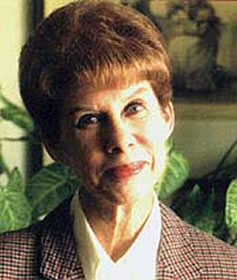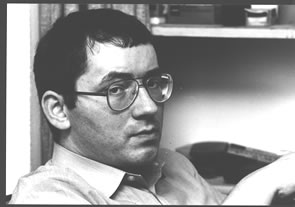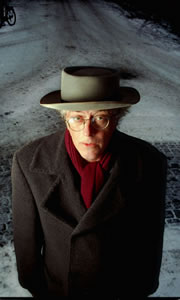De Belgische dichter en schrijver Georges Rodenbach werd geboren in Doornik op 16 juli 1855. Zie ook mijn blog van 16 juli 2007.
Uit: Bruges-la-Morte
“Le jour déclinait, assombrissant les corridors de la grande demeure silencieuse, mettant des écrans de crêpe aux vitres.
Hugues Viane se disposa à sortir, comme il en avait l’habitude quotidienne à la fin des après-midi. Inoccupé, solitaire, il passait toute la journée dans sa chambre, une vaste pièce au premier étage, dont les fenêtres donnaient sur le quai du Rosaire, au long duquel s’alignait sa maison, mirée dans l’eau.
Il lisait un peu: des revues, de vieux livres; fumait beaucoup; rêvassait à la croisée ouverte par les temps gris, perdu dans ses souvenirs.
Voilà cinq ans qu’il vivait ainsi, depuis qu’il était venu se fixer à Bruges, au lendemain de la mort de sa femme. Cinq ans déjà! Et il se répétait à lui-même: ‘Veuf! Être veuf! Je suis le veuf!’ Mot irrémédiable et bref! d’une seule syllabe, sans écho. Mot impair et qui désigne bien l’être dépareillé.
Pour lui, la séparation avait été terrible: il avait connu l’amour dans le luxe, les loisirs, le voyage, les pays neufs renouvelant l’idylle. Non seulement le délice paisible d’une vie conjugale exemplaire, mais la passion intacte, la fièvre continuée, le baiser à peine assagi, l’accord des âmes, distantes et jointes pourtant, comme les quais parallèles d’un canal qui mêle leurs deux reflets.
Dix années de ce bonheur, à peine senties, tant elles avaient passé vite!
Puis, la jeune femme était morte, au seuil de la trentaine, seulement alitée quelques semaines, vite étendue sur ce lit du dernier jour, où il la revoyait à jamais: fanée et blanche comme la cire l’éclairant, celle qu’il avait adorée si belle avec son teint de fleur, ses yeux de prunelle dilatée et noire dans de la nacre, dont l’obscurité contrastait avec ses cheveux, d’un jaune d’ambre, des cheveux qui, déployés, lui couvraient tout le dos, longs et ondulés. Les Vierges des Primitifs ont des toisons pareilles, qui descendent en frissons calmes.
Sur le cadavre gisant, Hugues avait coupé cette gerbe, tressée en longue natte dans les derniers jours de la maladie. N’est-ce pas comme une pitié de la mort? Elle ruine tout, mais laisse intactes les chevelures. Les yeux, les lèvres, tout se brouille et s’effondre. Les cheveux ne se décolorent même pas. C’est en eux seuls qu’on se survit! Et maintenant, depuis les cinq années déjà, la tresse conservée de la morte n’avait guère pâli, malgré le sel de tant de larmes. »
![Georges_Rodenbach_1895[1] Georges_Rodenbach_1895[1]](https://romenu553547602.files.wordpress.com/2008/07/25513-dyn009_original_295_192_pjpeg_2535747_e9c803799dab020e6e8df2661e955cb1.jpg?w=863)
Georges Rodenbach (16 juli 1855 – 25 december 1898)
Portret door Lucien Lévy-Dhurmer
De Cubaanse dichter en schrijver Reinaldo Arenas werd geboren op 16 juli 1943 in Holguin. Zie ook mijn blog van 16 juli 2007.
Uit: The Empty Shoes
”So pressing were his characters, appeals and so eager was he to respond that just a few hours earlier he had vowed to suspend all social activities and devote himself entirely to his novel, or story, since he didn’t yet know exactly where all this might lead him.
Yes, tomorrow he was definitely going to resume his solitary and mysterious occupation. Tomorrow, because tonight it would be practically impossible for him not to attend the large party being given in his honor by the grande dame of the Cuban literary circles in Miami, Sinora Gladys Perez Campo, whom H. Puntilla had nicknamed the Hayde Santamara of the exile community.
This event, however, was not merely cultural, but also had a practical purpose. Gladys had promised the writer that she would lay the foundation, that very evening, for a publishing house that would print the manuscripts that he had, at great risk, smuggled out of Cuba. Alfredo, incidentally, didn’t have a penny to his name and this, of course, could give him a tremendous financial boost, as well as help to promote the works of other important but still unknown writers less fortunate than Alfredo, who already had five books to his credit.
The publishing project will be a success, Gladys had assured him on the phone. The most prominent people in Miami will support you. They will all be here tonight. I am expecting you at nine, without fail.
At five to nine, Alfredo crossed the vast, manicured garden toward the main door of the Perez Campo mansion. The scent of flowers swept over him in waves, and he could hear pleasant melodies emanating from the top floor of the residence. As he listened to the music, Alfredo placed his hand
Hayde Santamara was the director of the government publishing house, La Casa de las Amricas, that decided which books would be published in Cuba. against the outside wall of the house, and the stillness of the night conspired with the garden and the thickness of the wall to give him a sense of security, of peace almost, that he had not experienced for many years, too many years. . . . Alfredo would have preferred to remain there, outside the house, alone with his characters, listening to the music from far away. But, always keeping in mind the solid publishing project that would perhaps one day allow him to own a mansion like this one and that could also mean the future salvation of Olga, Daniel, Delfn, Berta, and Nicols, he rang the doorbell.”

Reinaldo Arenas (16 juli 1943 – 7 december 1990)
De Engelse schrijfster en historica Anita Brookner werd geboren op 16 juli 1928 in Herne Hill, een voorstad van Londen. Zie ook mijn blog van 16 juli 2007.
Uit: Hotel Du Lac
„Edith Hope, a writer of romantic fiction under a more thrusting name, remained standing at the window, as if an access of good will could pierce the mysterious opacity with which she had been presented, although she had been promised a tonic cheerfulness, a climate devoid of illusions, an utterly commonsensical, not to say pragmatic, set of circumstances-quiet hotel, excellent cuisine, long walks, lack of excitement, early nights-in which she could be counted upon to retrieve her serious and hard-working personality and to forget the unfortunate lapse which had led to this brief exile, in this apparently unpopulated place, at this slowly darkening time of the year, when she should have been at home . . . But it was home, or, rather, ‘home’, which had become inimical all at once, so that she had acquiesced, rather frightened at what was happening to her, when her friends had suggested a short break, and had allowed herself to be driven to the airport by her friend and neighbour, Penelope Milne, who, tight-lipped, was prepared to forgive her only on condition that she disappeared for a decent length of time and came back older, wiser, and properly apologetic. For I am not to be allowed my lapse, as if I were an artless girl, she thought; and why should I be? I am a serious woman who should know better and am judged by my friends to be past the age of indiscretion; several people have remarked upon my physical resemblance to Virginia Woolf; I am a householder, a ratepayer, a good plain cook, and a deliverer of typescripts well before the deadline; I sign anything that is put in front of me; I never telephone my publisher; and I make no claims for my particular sort of writing, although I understand that it is doing quite well. I have held this rather dim and trusting personality together for a considerable length of time, and although I have certainly bored others I was not to be allowed to bore myself. My profile was deemed to be low and it was agreed by those who thought they knew me that it should stay that way. And no doubt after a curative stay in this grey solitude (and I notice that the leaves of that plant are quite immobile) I shall be allowed back, to resume my peaceable existence, and to revert to what I was before I did that apparently dreadful thing, although, frankly, once I had done it I didn’t give it another thought. But I do now. Yes.”

Anita Brookner (Herne Hill, 16 juli 1928)
De Duitse schrijver en journalist Jörg Christian Fauser werd geboren op 16 juli 1944 in Bad Schwalbach. Zie ook mijn blog van 16 juli 2007.
Uit: Ich habe eine Mordswut. Briefe an die Eltern
„Gestern nacht verhalf ich einem Tier zum Auf-die-Welt-kommen: der Schweizer, ein guter, in sich selbst wurzelnder Mann, und seine dicke Frau hatten außer ihrem Sohn keine Hilfe, um einer Kuh beim Kalben beizustehen, so kam er zu uns, und wir sahen also sowas zum ersten Mal, und mit dem Sohn des Schweizers zog ich aus Leibeskräften das schwarz-weiße Stück Kreatur aus dem Mutterleib, und die Mutter stand unsäglich verwundert dabei, die Ochsen unruhig, die Vögel im Stall begannen zu singen – und da lag dann dieses künftige Schlachtvieh im Stroh, der Schweizer rieb es ab, ich rieb mit, der Bauer, gerade von sonstwoher gekommen, mit gestreiftem Schlips und weißem Hemd stand daneben, sowas vergißt man nicht: die Augen des Tieres, das langsam aufnimmt, was die Welt ihm da hinhält: grobe Hände, Stroh, dampfende Ochsen, unverständlcihe Gesten, die irgendein Gott hohnlachend den Menschen auferlegte: wie weit weg von der Schöpfung dieser fett gewordene Bauer, welche Schöpfung, die einen Stock braucht und einen Strick, um einer Mutter das Kind aus dem Leib zu reißen, und beide, Mutter und Kind, nur ein Batzen in der Kasse des Bauern…
Man möchte dieser Welt, wie die Azteken annahmen, ein Ende in einer einzigen Explosion wünschen, nicht dieses entsetzlich langsame Dahinkriechen und alles reduziert auf Ziffern und Statistiken und alles mündend in der Unfähigkeit, Menschen wachsen zu lassen solange sie wachsen und Tiere ihren Teil an der Erde zu geben – was in Gottes Namen berechtigt uns eigentlich, etwas zu züchten, das die Schöpfung nicht hervorbrachte, und unser eigenes Ende entweder in Katastrophen und Bombenexplosionen und Gasvergiftungen zu verlegen oder uns künstlich länger am Leben zu halten?”

Jörg Fauser (16 juli 1944 – 17 juli 1987)
De Noorsde schrijver Dag Solstad werd geboren op 16 juli 1941 in Sandefjord. Zie ook mijn blog van 16 juli 2007.
Uit: Shyness and Dignity (Vertaald door Sverre Lyngstad)
„What he had in mind was that other conversation, the running conversation, which had always meant so much to Elias Rukla. It is possible that some men have such a relationship with their wife, or the woman in their life, that the running conversation can be had with her, but for Elias Rukla that had never seemed natural; his connection with her who was his wife was quite different and did not at all correspond to Elias Rukla’s need for a running conversation, nor, on second thoughts, could he see that the married couples he knew behaved in any other way than he and Eva in this matter, though he had to admit that he was possibly making this judgment all too superficially. To Elias Rukla, participating in a conversation had always seemed animating. There were few things that could rouse him more than to have been present at a conversation or discussion, both as it occurred and afterwards when he went home, or had come home and was reflecting on what had been said, sort of developing the argument further and, not least, improving his own remarks, which were usually few and not always equally good when they were uttered. But this polishing of one’s own remarks afterwards was part of it—yes, indeed, it was part of a rich life, Elias Rukla thought, his reflective voice laced with fervor. But, first and foremost, it was the conversation itself that was animating, whether it was carried on as a conversation between two friends, say, at some late hour of the night, or around a table with several participants, some of whom naturally dominated the discussion, while the others stayed more in the background, such as Elias Rukla, but always took a lively interest in what was being said, all but stirred to their depths. Even if you would sit all evening without saying a word, you had been ardently involved, waiting eagerly for the next argument from one of the dominant participants and repeating the words to yourself once they had been spoken, appraisingly, uh-huh, or hmm, or I’ll be damned, and without getting an inferiority complex because you had a tendency to agree with the last speaker, the last honorable speaker, and then changed your opinion when the next person said something, for that’s the way it is, Elias Rukla thought, fired up as he recalled these conversations he had so often been part of. But now and then it happened that Elias Rukla, too, had arrived at a clear idea, or at any rate something that could become a clear idea, which he was itching to bring up, while at the same time wondering if he dared to because it could well happen that what seemed so clear to his mind would appear rather stupid when he gave vent to his opinions in the form of a sentence or a remark, as had often happened and could easily happen again, except that, before Elias Rukla made up his mind, the conversation had taken a new turn and Elias Rukla’s idea was no longer of any interest because it would have had the effect of a straggler in the ongoing conversation—it’s important to take the floor at the right moment, Elias Rukla had often concluded when he came home, or was on his way home.”

Dag Solstad (Sandefjord, 16 juli 1941)
Zie voor onderstaande schrijvers ook mijn blog van 16 juli 2007.
De Franse dichter en schrijver van chansons Bernard Dimey werd geboren op 16 juli 1931 in Nogent-en-Bassigny (tegenwoordig Nogent).
De Oostenrijkse schrijver Franz Nabl werd geboren op 16 juli 1883 in Lautschin.
De Oostenrijkse schrijfster en politica Andrea Wolfmayr werd geboren op 16 juli 1953 in Gleisdorf.
